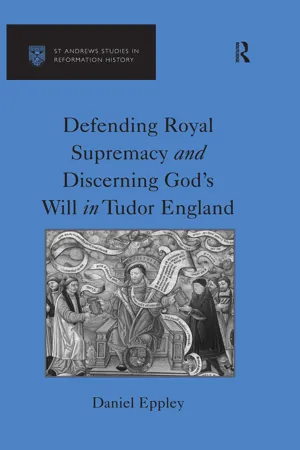
- 260 pages
- English
- ePUB (mobile friendly)
- Available on iOS & Android
Defending Royal Supremacy and Discerning God's Will in Tudor England
About This Book
Early modern governments constantly faced the challenge of reconciling their own authority with the will of God. Most acknowledged that an individual's first loyalty must be to God's law, but were understandably reluctant to allow this as an excuse to challenge their own powers where interpretations differed. As such, contemporaries gave much thought to how this potentially destabilising situation could be reconciled, preserving secular authority without compromising conscience. In this book, the particular relationship between the Tudor supremacy over the Church and the hermeneutics of discerning God's will is highlighted and explored. This topic is addressed by considering defences of the Henrician and Elizabethan royal supremacies over the English church, with particular reference to the thoughts and writings of Christopher St. German, and Richard Hooker. Both of these men were in broad agreement that it was the responsibility of English Christians to subordinate their subjective understandings of God's will to the interpretation of God's will propounded by the church authorities. St. German originally put forward the proposition that king in parliament, as the voice of the community of Christians in England, was authorized to definitively pronounce regarding God's will; and that obedience to the crown was in all circumstances commensurate with obedience to God's will. Salvation, as envisioned by St. German and Hooker, was thus not dependent upon adherence to a single true faith. Rather it was conditional upon a sincere effort to try to discern the true faith using the means that God had made available to the individual, particularly the collective wisdom of one's church speaking through its representatives. In tackling this fascinating dichotomy at the heart of early modern government, this study emphasizes an aspect of the defence of royal supremacy that has not heretofore been sufficiently appreciated by modern scholars, and invites consideration of how this aspect of hermeneutics is relevant to wider discussions relating to the nature of secular and divine authority.
Frequently asked questions
Table of contents
- Cover
- Half Title
- Dedication
- Title
- Copyright
- Contents
- A Note on the Sources
- Preface
- Introduction
- 1 The Henrician Supremacy and the Definition of Doctrine
- 2 Defending Royal Supremacy apart from the Definition of Doctrine
- 3 Christopher St German: Defending Royal Supremacy over the Definition of Doctrine
- 4 The Elizabethan Supremacy and the Admonition Controversy
- 5 Richard Hooker: Royal Supremacy over the Definition of Doctrine Reaffirmed
- Conclusion
- Bibliography
- Index